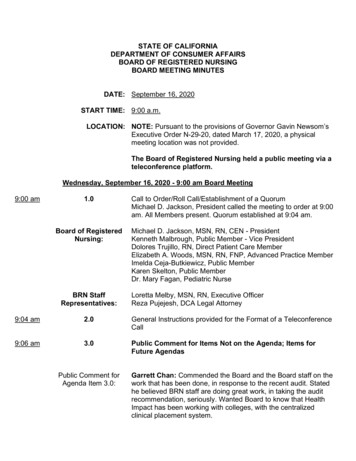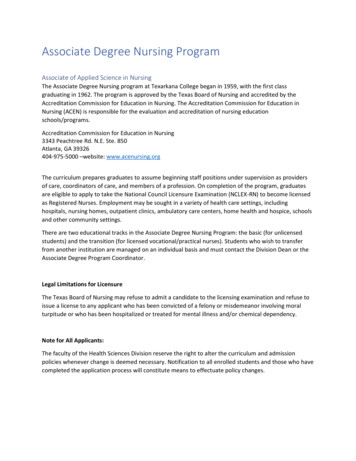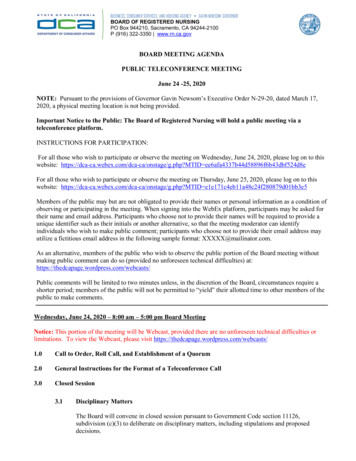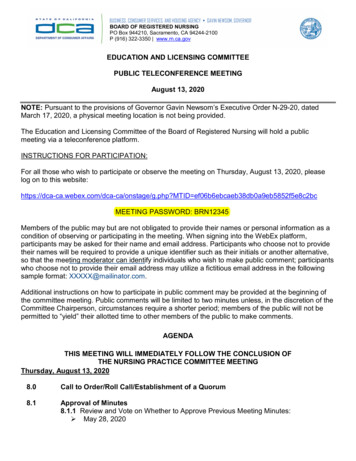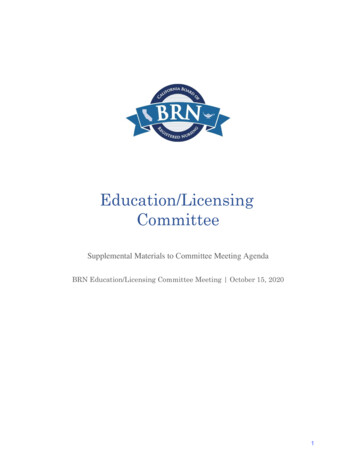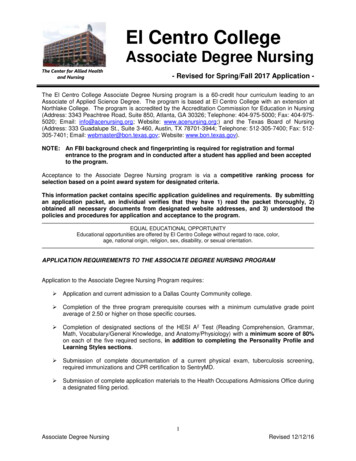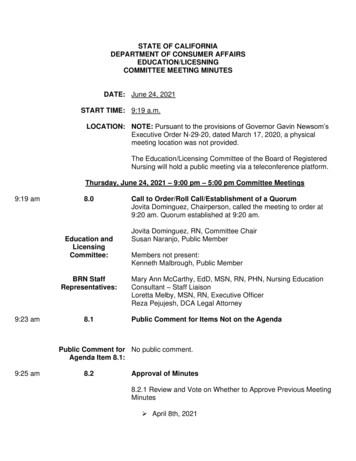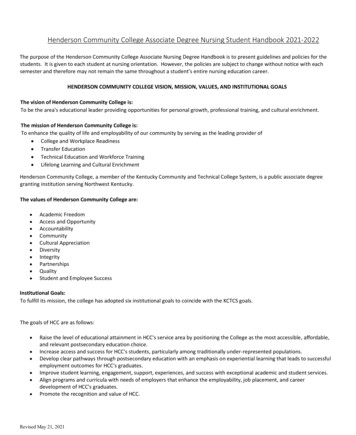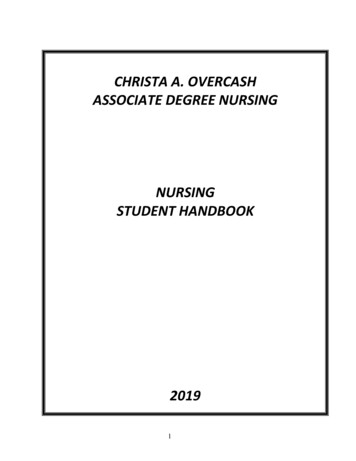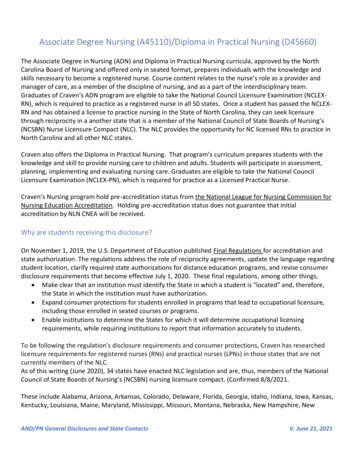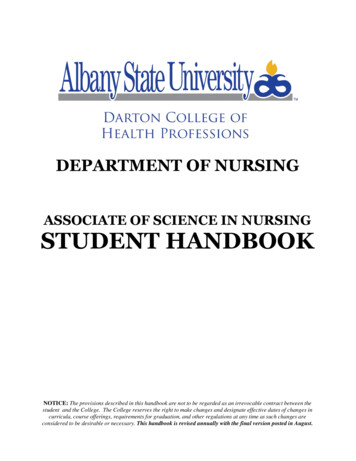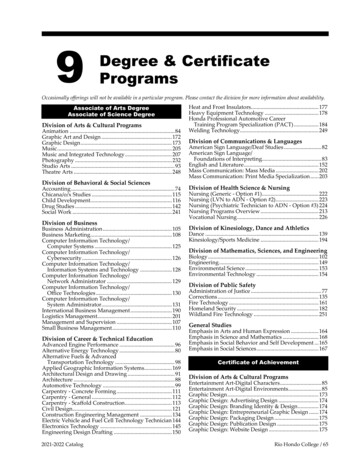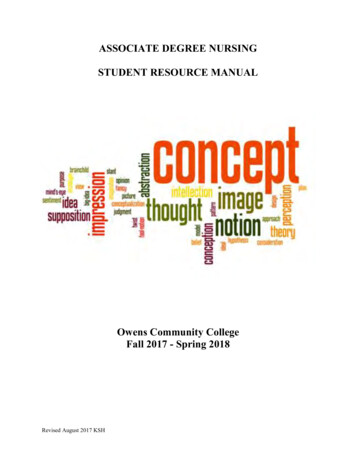
Transcription
ASSOCIATE DEGREE NURSINGSTUDENT RESOURCE MANUALOwens Community CollegeFall 2017 - Spring 2018Revised August 2017 KSH
i
TABLE OF CONTENTSChapter 1-Introduction . 1Introduction . 2Owens Community College, School of Nursing & Health Professions, & Nursing ProgramMission and Vision Statements . 3Chapter 2-Philosophy . 4Philosophy . 5Role of the Associate Degree Nurse . 6Outcomes . 7Assessment of Student Learning (Owens Community College Statement) . 8Chapter 3-Faculty Contact Information . 9Faculty Contact Information . 10Additional College Resources. 11Web Registration Instruction Sheet . 12Chapter 4-Program Information . 14Registered Nurse Program . 15Testing Accommodations . 18Comprehensive Testing Program: ATI . 18ATI – Comprehensive Predictor Exit Exam, Testing, & Remediation Policy. 21Math Testing . 22Chapter 5-Grading. 23Grading System. 24Chapter 6-Professionalism . 25ANA Code of Ethics for Nurses-Provisions . 26National Student Nurses’ Association, Inc. Code of Conduct . 27Disciplinary Action/Grounds for Dismissal Procedure (Nursing Program) . 29HIPAA . 36Clinical Health Requirements . 37Certified Background information sheet . 38ii
Changes in Health Status/Infectious Disease Procedure . 40Drug Screening Policy . 41Latex Allergy Policy . 41Health Problems/Pregnancy Procedures . 42Student Appeals Policy and Procedures/FERPA Policy/Academic Misconduct . 43Inclement Weather Guidelines . 45Chapter 7-Student Involvement / SNA . 46Student Involvement Guidelines . 47Student Nurse Association Information and Bylaws . 48Chapter 8-Graduation Program Completion . 54Final Semester Graduation Information. 55Request for Degree and Certification Completion Steps . 55Application to the Ohio Board of Nursing (Requirements for) .56Fingerprinting for NCLEX-RN. 57Criminal Record Checks . 58Pinning Ceremony . 62Class Pictures/Additional Requirements. 62Awards/Honors (Nursing)Dr. Peggy A. Bensman Award. 63Barbara Rood Student Choice Award . 63Scholarship Information . 63Chapter 9-Skills Lab . 64Skills Lab (Nursing) Guidelines . 65Skills Lab Visitor/Food Policy. 66Equipment Sign-out Procedure . 67Chapter 10-Clinical. 68Preparing for Clinical . 69Evaluation Procedures . 69Clinical -When and Where (1st day of clinical) to Report/Attendance Policy . 70Emergency Message Procedures. 71Clinical Site Selection .72Medication/ Procedure Occurrence Report and Bodily Injury/Exposure to Communicable DiseaseOccurrence Report . 73iii
Chapter 11-Student Support Services . 84Nursing Education Enhancement and Development (NEED) Program . 85Advising . 86Disability Services . 87Chapter 12-Appendix . 88Student History and Physical Examination . 89Skills Lab (Nursing) Referral Form . 93Health Care Release Form . 94Pregnancy Release Form. 95Readmission Form – Academic . 96Readmission Form – Non-Academic . 97Student Complaint Worksheet 98Chapter 13-Helpful Tools . 99Nursing Journals (Toledo Campus) . 100Nursing Journals (Findlay Campus) . 101Guide to APA Format . 102References . 103Index (Alphabetical) . 104Rules and Procedures Manual under Course Shell for each semesteriv
Chapter 1IntroductionMission & Vision StatementsOCC Nursing Student Resource ManualPage 1
INTRODUCTIONWelcome to the Owens Community College Program of Nursing. This Resource Manual wasdeveloped for your information and guidance, is updated annually, and contains rules andprocedures specific to the Nursing Program. This manual also emphasizes selected collegepolicies and procedures that may be of special significance to nursing students. For additionalcollege policies and procedures not found in this manual, please refer to the current onlineOwens Community College catalog.It is the student’s responsibility to read and abide by the policies and procedures herein. Keepthis Resource Manual as a reference throughout your nursing education at Owens CommunityCollege.If changes occur in rules and procedures, the student will be notified prior to implementation ofsuch policies and procedures. Refer to Blackboard each semester for changes made in theStudent Resource Manual.We hope your experience at Owens Community College is positive as you grow in yourknowledge as a professional nurse.The Nursing Program*** The Nursing Program reserves the right to amend, adjust, or revisethis manual as circumstances warrant the need to do so. ***For ease of reference to material contained within this document see Table of Contents on Pages ii, iii, and iv.OCC Nursing Student Resource ManualPage 2
OWENS COMMUNITY COLLEGE,SCHOOL OF NURSING & HEALTH PROFESSIONS& PROGRAM OF NURSINGMISSION & VISION STATEMENTSCollege:MISSIONWe believe in serving our students and our communities. Your success is our mission.VISIONOwens faculty and staff are committed to strengthening the community by providing asuperior educational experience through excellence, innovation and collaboration.School of Nursing and Health Professions:MISSIONThe School of Nursing and Health Professions prepares students to become competenthealthcare professionals who provide knowledgeable, accountable and conscientious careand service to the communities we serve. Revised 7-2017VISIONThe School of Nursing and Health Professions is committed to providing an outstandingand innovative educational experience through collaboration with community partners tomaximize student success. Revised 7-2017Program of Nursing:MISSIONThe Owens Community College Nursing Program believes in preparing caring andcompassionate nurses who will provide competent care for individuals and familieswithin communities in a changing and diverse healthcare environment.VISIONThe Nursing Program’s faculty and staff are committed to providing a dynamic andinteractive educational experience that incorporates a caring philosophy, evidence-basedpractice, and a commitment to lifelong learning and service.OCC Nursing Student Resource ManualPage 3
Chapter 2Registered Nursing Program PhilosophyRegistered Nursing Program OutcomesRegistered Nursing End-of-ProgramStudent Learning OutcomesOCC Nursing Student Resource ManualPage 4
OWENS COMMUNITY COLLEGEConcept Based Curriculum Overview:The study of nursing concepts provides the learner with an understanding of essentialcomponents associated with nursing practice without becoming saturated and lost in the detailsfor each area of clinical specialty. If concepts are understood deeply, links can be made whenthese are applied in various areas of nursing practice. The conceptual approach also fostersfuture advancement of the nursing discipline.Giddens, Jean: Concepts for Nursing Practice, 2nd ed. 2017, Elsevier, Inc.ASSOCIATE DEGREE NURSING PROGRAM PHILOSOPHYOwens Community CollegeRegistered Nursing Program Organizational Framework and PhilosophyThe organizing framework/philosophy of the Owens Community College Associate DegreeNursing Program reflects the mission and vision of the College, the School of Nursing andthe Nursing Program. Professional standards of nursing practice and nursing educationprovide the basis for curriculum development.Quality Safety Education in Nursing (QSEN) competencies and the National League for Nursing(NLN) competencies for graduates of Associate Degree Programs provide the structure forthe organizing framework. The NLN competencies of Human Flourishing, NursingJudgment, Professional Identity and Spirit of Inquiry are integrated into the programoutcomes as well as the QSEN competencies including Patient Centered Care, Teamworkand Collaboration, Evidence-Based Practice, Quality Improvement, Safety andInformatics. Nursing course content is organized using the ANA Standards of Practice andQSEN Knowledge, Skills & Attitudes (KSAs).The curriculum is organized using three broad categories of nursing practice including health andillness concepts, professional nursing and health care concepts, and patient profileconcepts. Health and illness concepts include physiological and psychosocial health issues.Professional nursing and health care concepts include the role of the caring nurse and thehealth care delivery system. Patient profile concepts include personal preferences,attributes and resources, (Giddens, 2013).The curriculum is delivered using a conceptual base including exemplars of commoncontemporary health issues represented in regional, state and global populations asidentified by the World Health Organization (WHO), Healthy People 2020, and the Centersfor Disease control (CDC).OCC Nursing Student Resource ManualPage 5
Nursing is a professional practice discipline that incorporates evidence-based practice andinterdisciplinary collaboration to provide for patient safety and to achieve quality patientcentered outcomes. Nurses care for individuals, families, and communities to promote,maintain, and restore health, or to support a peaceful death. Nursing process is used as abasis for nursing care decisions.Health is defined as a state of optimal physical, emotional, social and spiritual well-being that isregarded as a dynamic continuum that occurs throughout the life span.Associate Degree Nursing Education provides a dynamic pathway for entry into professionalregistered nurse (RN) practice. The faculty is responsible for designing and implementinga curriculum that is continually evolving to reflect community needs and current andemerging healthcare delivery systems (OADN, 2006). Faculty and students collaborate topromote professional development and achieve program outcomes.Learning is an interactive process in which the faculty and students share responsibility. It is alifelong process that integrates previously learned concepts with new information andexperiences. Expanded knowledge, refined skills, and broadened attitudes result inchanged behaviors that foster personal and professional growth.Concepts are organized blocks of information that are used to help students find connectionsbetween prior knowledge and new knowledge gained. Linked together, these organizedthreads provide the context for learning. Students use concepts as a framework to assembleinformation and apply reasoning skills when responding to new situations.ROLE OF THE ASSOCIATE DEGREE NURSEStudents develop a perception of the role of the associate degree nurse as a caring and competentcommunicator, manager, educator and member of the nursing profession who provides care in avariety of settings. In this role, the associate degree nurse uses problem-solving techniques tocollaborate with health team members. Students recognize that the associate degree nurse must beresponsible, accountable and keep pace with the growing body of nursing knowledge.OCC Nursing Student Resource ManualPage 6
REGISTERED NURSING PROGRAM OUTCOMES1. NCLEX results for first time test takers will be at or above the national mean.2. Students enrolled in NUR 101 will graduate in six (6) semesters at a 75% completionrate, and students enrolled in NUR 110 will graduate in five (5) semesters at a 75%completion rate.3. Within one year of graduation, 75% of graduates seeking employment as registerednurses are employed.4. One year after graduation, 85% of graduates responding will evaluate themselves asadequately prepared for an entry level nursing position.5. Employers responding to the employer survey will report satisfactory graduateperformance 85% of the timeREGISTERED NURSING END-OF-PROGRAM STUDENT LEARNING OUTCOMESRegistered Nursing Graduates will be able to:1. Integrate knowledge, skills and attitudes when using the nursing process to make clinicaljudgments to provide compassionate and culturally sensitive patient-centered care.2. Incorporate information and technology with a spirit of inquiry to support evidence-basednursing clinical judgments.3. Function effectively in an effort to promote human flourishing as a member of the interprofessional team by collaborating and communicating with patients, supportsystems/families and the community.4. Provide a caring, comforting and protective nursing environment, by consistentlydemonstrating nursing practice that reduces risk potential and promotes patient safety.5. Examine data, monitor outcomes, and implement methods to improve quality of care forpatients, patient support systems/families and the community.6. Model the professional identity of the nurse as a manager of care, educator, advocate,mentor, and leader.OCC Nursing Student Resource ManualPage 7
Owens Community College Statement on the Assessment of Student LearningAt Owens Community College (OCC), assessment is a high priority in helping the Collegemaintain a high-quality learning environment for all students.PurposeThe purpose of assessment of student learning is to help the College determine the extent towhich it is fulfilling its mission of educating students. Assessment allows the College to makeimprovements in program structure, course content, and pedagogy. It also assists in advisementand placement and provides students with indicators of their performance.Assessing Student Learning at the Program LevelAssessment at the program level provides a clear sense of what the program is designed toaccomplish and what students who complete the program should know, understand, and be ableto do when they graduate. Ultimately, the assessment process yields data that informs faculty andother decision-makers and other decision-makers about relevant issues impacting the programand student learning. Data is used as a foundation to support recommendations for programimprovement.Assessing Student Learning at the Institutional LevelAssessment monitors the competence of students, not just in terms of expertise in their programof study but also with respect to the attainment of general education. All degree-seeking studentsat Owens must complete a core of courses to provide a foundation that aids in the achievement ofgeneral education competencies in writing, oral communications, mathematics, and computerskills. Theses competencies are integrated into and reinforced in all degree programs throughnon-general education courses.In addition to the core competency categories discussed above, the College has identified a numberof other important components of its General Education Program. Owens Community Collegeencourages and supports initiatives at the personal, programal and college-wide levels that helpstudents develop and augment those values and skills necessary for successful living in anincreasingly complex and ever-changing global environment. These components of the College’sStudent’s RoleStudents are assessed at all levels of institutional operations, including program and generaleducation levels, at different points during their academic career at Owens. Typically,assessment is embedded within the teaching function of Owens and occurs during each student’sregular academic effort. The student’s role is very important in the assessment process. Indeed,student participation is an essential component of a successful program. Through participationand the demonstration of competence in course material as well as general education corecompetencies the College is able to get a series of snap shots of a student’s performance. Thisinformation is listed on The Owens Community College website, www.owens.edu.OCC Nursing Student Resource ManualPage 8
Chapter 3Faculty Contact InformationOCC Nursing Student Resource ManualPage 9
FACULTY CONTACT INFORMATIONNameCatherine Ford, DeanIrene Jones, ChairRuth Ankele, Assistant Chair, NursingMichelle Shephard, Assistant Chair, LabOperationsAmy Dixon, NEED CoordinatorBria Blodgett-Thomas , Advisor, In-ProgramNursingSandra Browning, Part-time AdvisorEileen AlexanderBeverly BaneyDebra BaumgartnerLacey DavisLaurie ErfordRobin Foster/Findlay RN/PN Lab 020 ALynda GlanzMarcia GrizzardAnne HelmKimberly HolmanCynthia HotalingChristine KettingerJulie LohseTiffany LudwigMargaret LudwikoskiDiane McDougleJulie McLaughlinBarbara MillerJennifer MierJanet PinkelmanJennifer SandersMelanie ScherdtLuann SnyderDenise SpohlerDeborah SullivanCecilia TolsonKaren WehmanLou WhitakerDarlene Wise/Findlay HPS Lab 020 DPatricia Zenner/RN Lab HH 209Toledo Nursing OfficeCheryl Perlacky/Toledo PN LabEmail AddressPhone # All end: @owens.edu Office Location7273Catherine fordHH 204 E2111irene jonesHH 204 F7259ruth ankeleHH 209 lle shephardamy dixonbrianne blodgett@owens.edusandra browningeileen alexanderbeverly baneydebra baumgartner4lacey davislaurie erfordrobin foster2lynda glanzmarcia grizzardanne helmkimberly holmancynthia hotalingchristine kettinger2julie lohsetiffany ludwigmargaret ludwikoskidiane mcdouglejulie mclaughlinbarbara miller3jennifer mierjanet pinkelmanjennifer sanders3melanie scherdtluann snyderdenise spohlerdeborah sullivancecilia tolsonkaren wehmanlou whitakerdarlene wisepatricia zenner2cheryl perlakyToledo campus is 567-661-7338OCC Nursing Student Resource ManualPage 10HH 204 AHH 204 BBHH 204 AAHH 204 CHH 204 Z121 D (F)020 C (F)121 Q (F)HH 204 L020 C (F)123 B (F )CH 120 JHH 204 JHH 204 Y115 N (F)HH 204 QHH 204 SCH 120 JHH 208 AHH 204 P115 U (F)HH 204 VCH 120 KHH 204 RHH 204 X121 P (F)HH 204 THH 204 KHH 204 QHH 204 UHH 204 WCH 120 M123 D (F)209 UHH 204 DHH 206 C
ADDITIONAL COLLEGE RESOURCESStudents may wish to utilize the following resources offered by the college throughout their courseof study:TOLEDO – AREA CAMPUS1. Common Computer LabCH 156567-661-27242. Disabilities ServicesAlumni Hall 103567-661-70073. LibraryLibrary567-661-70154. Math LabTT 213567-661-74095. Testing CenterCH 157567-661-83786. Writing CenterFH 1123567-661-73517. Teaching Learning CenterCH 156567-661-20081. Common Computer LabFS 152567-429-35572. Office of AcademicEnhancement and StudentResource CenterFS 150567-429-35093. Disabilities ServicesFS 112567-429-35004. LibraryEC 176567-429-30885. Testing CenterEC 124567-661-83786. Writing CenterEC 149567-429-35837. Math LabFS 149567-429-3583FINDLAY – AREA CAMPUSOCC Nursing Student Resource ManualPage 11
Nursing StudentWeb Registration Instruction SheetStudents must follow the guidelines listed below when registering via the Web:1. Know your OZONE password.2. Check the number of hours taken at college in order to determine which date to register.This can be found on OZONE. Number of hours include: all graded hours at OCC and alltransfer hours. Hours not included are the hours registered for during the currentsemester.3. Check the course (both Nursing and support courses) needed for the next semester –check the Student Resource Manual and/or the College Catalog of the semester in whichyou began the NRS courses.4. Check the master schedule for open course, lab and clinical sections – be sure to writedown the CRN because it is quicker to register when you know the CRN. Toledo Campusstudent – please remember that the class, clinical and lab MUST be in the same option.Students cannot mix campuses or options.5. Students on financial hold will not be able to register – make sure all financial obligationshave been met at the college before attempting to register.6. If one part of a course is full when registering, (e.g. clinical section) then all parts of thecourse will be removed from the registration. Students will need to find an open clinicalsection and then re-register for the entire course (class, clinical and lab – as applicable).7. You MUST register for all required nursing courses and support courses at the same timeotherwise you will not be able to register for nursing courses.8. Course fees will not be paid at the time of registration on the WEB. There is a one-daydelay for the computer processing, so payment of fees can be made the day afterregistration has been completed.9. Make sure that the classes, labs and clinicals that you select are on the correct campus:Findlay class, lab and clinical sections are designated by odd numbers, e.g. NRS 122 001 (class), B01 (lab), C01 (clinical)Toledo class, lab and clinical sections are designated by even numbers, e.g. NRS 122- 002 (class), B02 (lab), C02 (clinical)10. No nursing course lecture, lab or clinical section may be changed after the first day of thecourse without the Chairperson’s signature.OCC Nursing Student Resource ManualPage 12
11. Third semester Basic RN or second semester LPN/ADN students who are scheduled tograduate in the next semester must complete a graduation application form one semesterbefore graduation. It would be advisable to run a degree audit at this time. A degree auditmay be run by completing the following:1. Log in to ozone2. click degree evaluation3. click on the most recent semester4. Your major of Registered Nursing, Practical Nursing or Registered NursingLPN should appear as your major, if it does, follow the prompts. If it does not:select "What If" at the bottom and then in the major selection change it to theappropriate major (this usually happens for 1st semester students or those whochange a start date) then follow the prompts.5. Your audit will show RED No's next to the courses you have not taken.6. If you see a NO next to a class, that means you will need to take it, or youmay need a course substitution.7. If you have questions, contact your advisor via email or call the nursing officeat 567-661-7338 and schedule an advising appointment.The form can be obtained via your Ozone account. Failure to complete the applicationwill result in the student not being eligible for graduation during the semester in whichthe student had planned to graduate and the student will pay a late fee.OCC Nursing Student Resource ManualPage 13
Chapter 4Program InformationOCC Nursing Student Resource ManualPage 14
Ohio Board of RegentsOperating Manual for Two-YearCampus Programs3/04Format/AssociateDegree ProposalPage 402.8Curriculum SummaryProvide a summary and classification of the course comprising the program by quarter/semester, assuming full-time enrollment.Provide subtotals of credit hours by quarter, semester, by course type, and by total credit hours required.Owens Community CollegeCampusRegistered Nursing ProgramAssociate Degree ProgramCourse #FNH 121BIO 211IST 100NUR 101HIT 125April 15, 2014DateContact HoursClassLabCourse Title1st SemesterBasic NutritionAnatomy & Physiology IFundamentals of Computing SystemsIntro to Nursing ConceptsLanguage of Medicine23143Credit HoursTech Non-Tech24136 lab/6 clinical88BIO 212PSY 101NUR 102BIO 231ENG 111NUR 2012nd SemesterAnatomy and Physiology IIGeneral PsychologyNursing Concepts Across the Lifespan363rd SemesterMicrobiology and ImmunologyComposition IAdult Health Concepts337333 lab/6 clinical439933 lab/6 clinical1010MTH 213PHL 10233NUR 202Complex Health Concepts (10
contemporary health issues represented in regional, state and global populations as identified by the World Health Organization (WHO), Healthy People 2020, and the Centers . (CDC). OCC Nursing Student Resource Manual Page 6 Nursing is a professional practice discipline that incorporates evidence-based practice and interdisciplinary .
